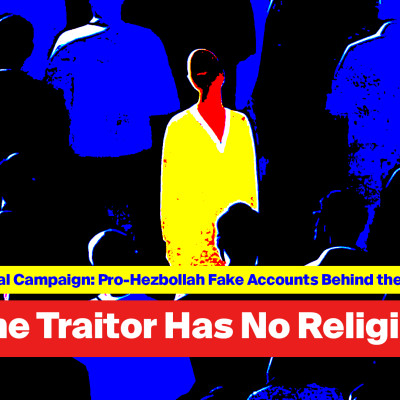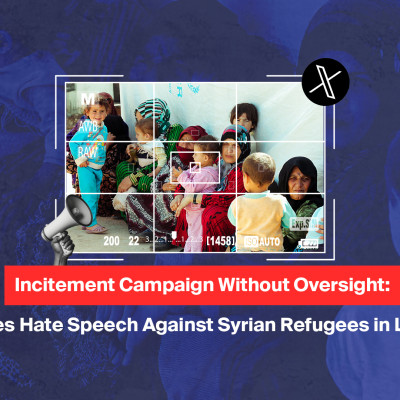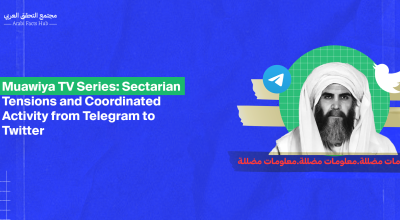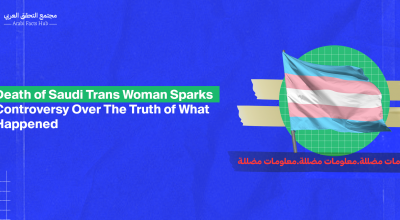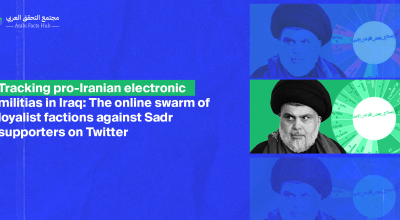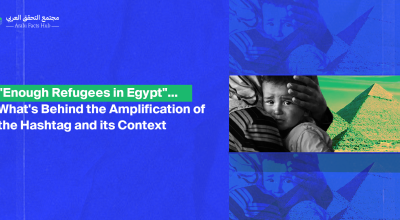Iraqi Coordinated Campaign Attributes Assad's Fall to “His Rapprochement with the Gulf”
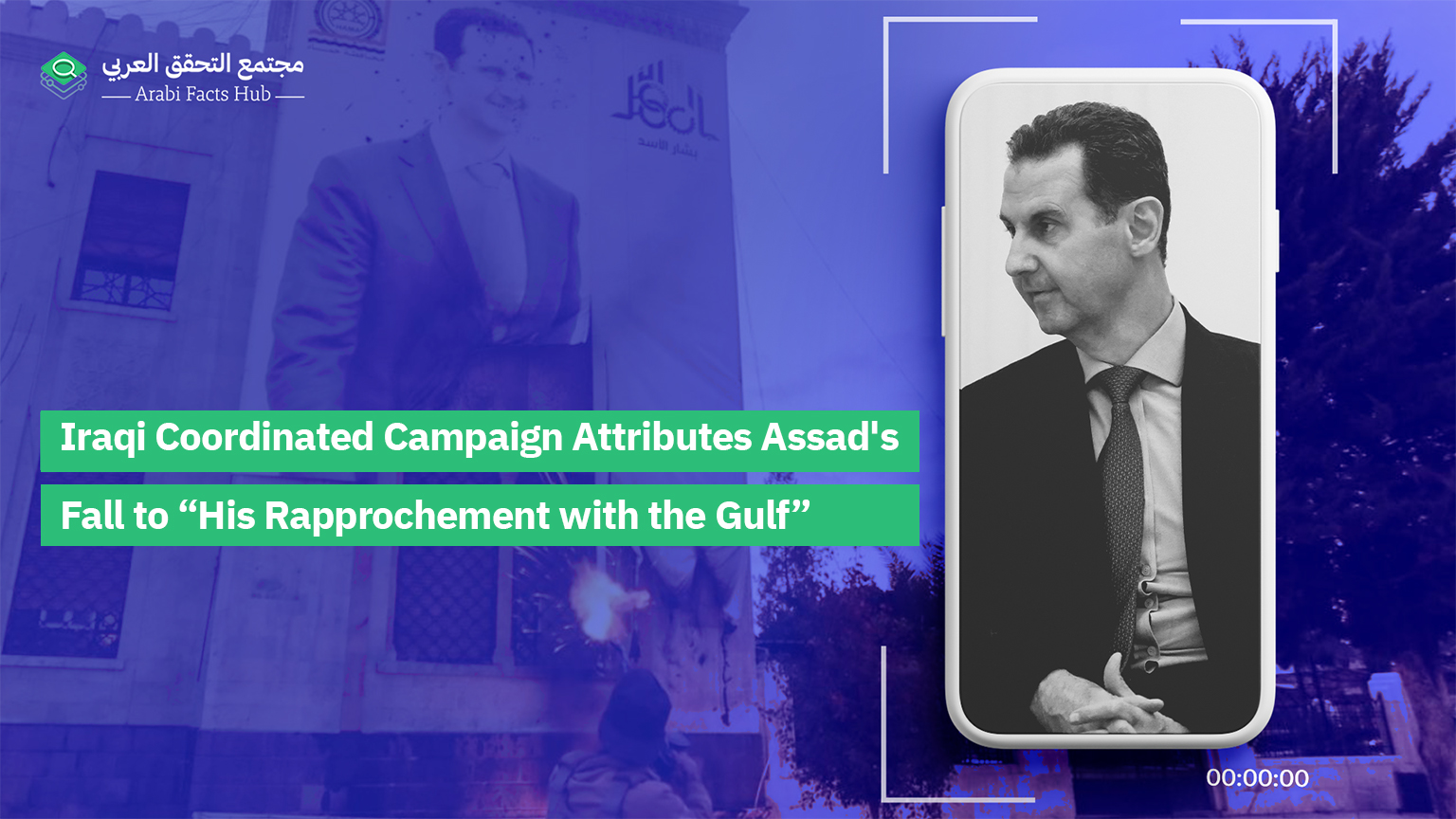
Iraqi accounts have been active in a coordinated campaign linking Assad's fall to his rapprochement with Gulf countries in the final years of his rule, asserting that Iraq will not face a similar scenario due to its alignment with the 'Axis of Resistance.' Campaign organizers amplified these narratives by using fake accounts and repetitive content interspersed with disinformation.
Since the fall of the regime, several hashtags have been active, including العراق_ليس_سوريا (Iraq is not Syria), الارهاب_استباح_سوريا (Terrorism overtook Syria), and العراق_هزم_الإرهاب (Iraq defeated terrorism), which collectively garnered over 20,000 posts on X and were viewed at least 1.5 million times, according to Meltwater statistics.
Posts circulating under these hashtags promoted the idea that Iraq differs from Syria due to its “ideologically driven paramilitary force ready to make sacrifices.”
These posts generated around 42,000 interactions, including likes, reposts, and comments. The hashtags peaked multiple times, reaching their highest point on December 8, 2024, the day of Assad’s regime collapse, which saw over 8,000 posts on that day alone.

Periods of Activity of the Three Hashtags – Meltwater
Who is leading the campaign?
A total of 9,278 accounts contributed to bringing campaign hashtags to life. Several indicators suggest a significant involvement of supporters of ‘Asa'ib Ahl al-Haq militia, led by Qais al-Khazali, as key participants in the current campaign on the situation in Syria.
”
A total of 9,278 accounts contributed to amplifying the campaign’s hashtags, with several indicators pointing to the prominent involvement of supporters of the Iran-backed ‘Asa'ib Ahl al-Haq (League of the Righteous) militia, led by Qais al-Khazali, as key participants in the ongoing discourse on Syria.
Many of these supporters’ accounts feature Qais al-Khazali’s image in their profiles and actively promote highly focused political propaganda in his favor.


Forces from ‘Asa'ib Ahl al-Haq had previously participated in Syria’s civil war in support of the former Syrian regime, despite Qais al-Khazali’s denial of their involvement.
A report by the Washington Institute for Near East Policy in April 2021 indicated that the militia had strengthened its ties with the Axis of Resistance under Iran’s Quds Force within the Islamic Revolutionary Guard Corps (IRGC). The report stated that the group had deployed a unit to fight in Syria’s civil war under the operational control of the Quds Force and had been reported to engage in battles in Aleppo and Damascus.
Meanwhile, other accounts displayed profile pictures of leaders from various Iraqi, Iranian, and regional Shiite factions and groups, such as Abu Mahdi al-Muhandis, the former deputy commander of the Popular Mobilization Forces (PMF), who was killed alongside Quds Force commander Qasem Soleimani in a U.S. airstrike in Baghdad in early 2020. Profile images also included figures like Hassan Nasrallah, the secretary-general of Hezbollah, and Iran’s Supreme Leader Ali Khamenei.



Opening Strike and Cross-Platform Posts: Signs of Coordination
Several indicators suggest coordinated activity, as campaign accounts operated in a synchronized manner to disseminate their messages. This was evident through synchronized posting times, repetitive messaging, and the consistent nature of the shared content.
”
Several indicators suggest coordinated activity, as campaign accounts operated in unison to spread their messages. This coordination was evident through synchronized posting times, repetitive rhetoric, and the consistent nature of the shared content.
At 3:33 PM GMT on December 8, the account "Bint Al-Muhandis" (@H__PLKM)—created in late 2022—signaled the launch of a wave of posts with a tweet stating, "Everyone starts in a few minutes," referring to the campaign’s hashtags.
This post followed a tweet by the account of lawyer Zina Al-Khafaji (@zena_shaker1988), in which she expressed outrage over alleged scenes from Sayyida Zainab’s shrine in Damascus, claiming it had been attacked by "terrorist gangs." She likened the incident to "the Umayyad assault on Sayyida Zainab’s shrine."
The account attributed to Al-Khafaji has similar versions across multiple social media platforms and actively promotes propaganda in support of ‘Asa'ib Ahl al-Haq leader Qais al-Khazali, much like Bint Al-Muhandis.

Some posts circulated across different platforms. For example, the account "Al-Umma Al-Ameeqa" (The Deep Nation)—created on X in October 2024—initially shared a lengthy post on its Telegram channel, which has 1,592 subscribers, before reposting it on X with the hashtag #العراق_ليس_سوريا (Iraq is not Syria). In the post, the account compared the situations in "New Syria" and Iraq, discussing the political system, government formation, and military structure. It emphasized what it described as the presence of a "solid-core ideological force that led a great national liberation," referring to the Popular Mobilization Forces (PMF) as Iraq’s official parallel army.
The post concluded with praise for "a courageous, wise leader with strategic vision and action—Sheikh Al-Amin, the spear of the nation, the heir of fortune and destiny, a man representing the ‘Master of the Heavens,’ a cultured and devoted general, and a noble resistance engineer who founded the sacred Popular Mobilization Forces." The post was accompanied by an image of Qais al-Khazali.


Similarly, there was just a one-minute gap between the reposting of content by the "Huroof Sumerya" (Sumerian Letters), @alijahied account on X, and the post on Telegram.
At 4:36 PM on December 8, the account posted a tweet featuring a high-quality graphic with the text: "Terrorism triumphed in Syria… but was defeated in Iraq." The image displayed the flag of ISIS alongside the Syrian independence flag adopted by the opposition, while a hand held up the Popular Mobilization Forces (PMF) flag in contrast.
Just one minute later (4:37 PM), the same post was shared on the "Huroof Sumerya" Telegram channel, which has 5,751 subscribers.
The post stated: "There is a huge difference between Iraq—its leaders, its men, and their legendary resilience—and Syria, where Bashar and his army handed the country to terrorism on a silver platter. We are here to tell you about Iraq and its bravery."
Over the past few years, this account has played a significant role in promoting the narratives and interests of Iran-aligned Shiite groups, as well as participating in influence campaigns linked to them.


Arabi Facts Hub observed the repeated circulation of the same design in the days following the campaign’s launch, often accompanied by identical text that was reposted across multiple accounts. These texts and designs can be explored by searching for the following phrase on X:
“العراق لن يسمح بتكرار المأساة السورية على أرضه، لأنه يمتلك قيادة وشعباً أقوى من كل التحديات والمؤامرات”
(Iraq will not allow the Syrian tragedy to be repeated on its soil because it has leadership and a people stronger than all challenges and conspiracies).
Many of the accounts sharing this content exhibit strong indicators of being fake, including low follower counts, minimal engagement, and a concentrated focus on promoting Qais al-Khazali’s propaganda.








Other accounts, whose activity is limited to retweeting/reposting, also played a role in amplifying the spread of the hashtags. One such account is @Pearlbh2, which uses the retweet icon as its profile picture— a common feature for accounts tasked with this role during online campaigns.
The account’s manager claims to operate from Bahrain and displays the flags of Iran and countries that support armed groups within it. The account has posted over 278,000 tweets since its creation in October 2021, a record-high rate rarely seen from accounts linked to real individuals, highlighting its use for targeted purposes. The account has shared only 57 posts related to the hashtags in this analysis.


Geographically, Iraq led the countries in posting tweets with a total of 3,000 tweets, followed by Saudi Arabia with 239 tweets, Lebanon (179), the United States (156), and Yemen (137).
In contrast, about 16,000 tweets came from accounts with unknown geographic locations, representing approximately 76% of total tweets. This is another indicator of manipulation and non-organic activity through the hashtags.

Disinformation and sectarian rhetoric
The comparisons in the content of the hashtags between the situations in Iraq and Syria seemed like an attempt to reassure supporters of Iraqi groups that the Syrian scenario would not be repeated. They emphasized that "Iraq will not allow the Syrian tragedy to be repeated," while justifying Iran's absence—Syria’s ally in the war against the opposition—by blaming Assad’s "wrong policies", which "the Syrian people paid the price for", and which made "Syria an easy prey for terrorist groups." Furthermore, it was asserted that Assad had "chosen to distance himself from the Axis of Resistance and fall into the arms of Saudi Arabia and the UAE."
Accompanying this narrative was the spread of disinformation and sectarian rhetoric, which sought to heighten tensions between different religious sects, particularly Shia and Sunni.
Campaign accounts also promoted claims of violations and shared old videos as if they had occurred under the new regime in Syria. One such video was accompanied by a message claiming that "those who miss Friday prayers under the new (terrorist) Syrian regime are punished with 25 lashes in public."
It was later revealed that the video was old, originally published in March 2016, showing an ISIS member flogging a man as punishment for not attending Friday prayers.

The posts contained sectarian language and hate speech targeting Sunni Muslims, labeling them as "saboteurs, corrupt, and terrorists", referring to them as "Wahhabi Sunni bombers," "destructive groups," and using derogatory terms such as "inferior lowlifes."



The same accounts became active in attacking Ahmad al-Sharaa—formerly known as "Abu Mohammad al-Julani"—following the announcement on January 29, 2025, that he would take over the presidency of Syria during the transitional phase.
Some accounts went so far as to claim that "removing al-Sharaa from the Syrian political scene is an international necessity due to his representation of a banned radical Islamic regime, and that it would provide a legitimate excuse for a counter-revolution in Syria to oust him from power."
